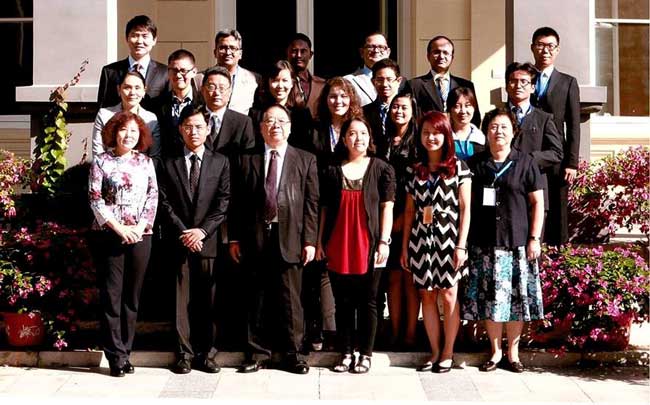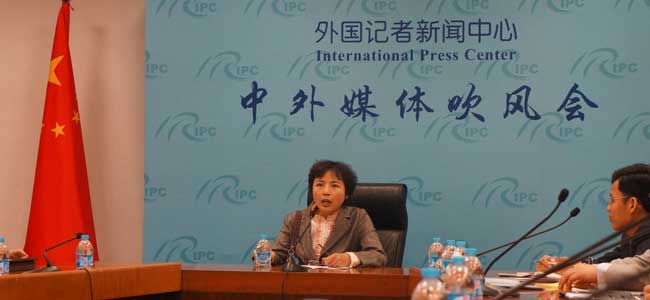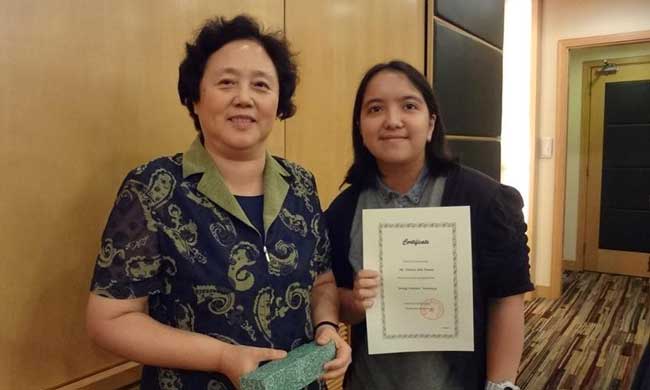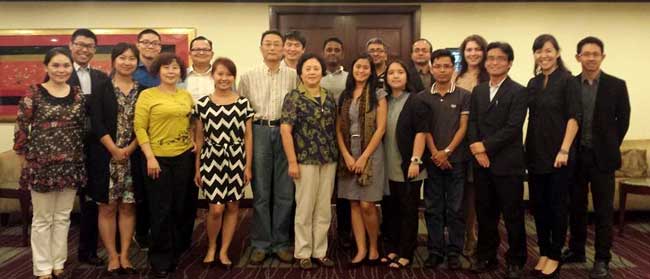Cooperation and security increasing youth awareness on Asia-Pacific security
The Council for Security Cooperation in the Asia Pacific (CSCAP) China, in collaboration with the China Institute of International Studies (CIIS), hosted the first Asia-Pacific Young Scholars Workshop on September 1-10, 2014 in Beijing and Shanghai, China. Seventeen young scholars from different countries in the Asia-Pacific Region, including CenPEG Policy Researcher Danica Panelo, were invited to participate in the workshop for the purpose of increasing youth awareness on regional security issues and preparing today’s generation to become efficient leaders in the near future.
Aside from the Philippines, the countries represented included Singapore, Vietnam, Cambodia, Japan, China, Russia, South Korea, India, Bangladesh, Malaysia, and Thailand.

Participants of the first Asia-Pacific Young Scholars Workshop, together with Ambassador/CSCAP China Chair Ma Zhengang (bottom row, third from left), CSCAP China Vice-Chair and Secretary General Wang Haihan (bottom row, far right), CIIS Secretary General Yang Yi (second row, second from left), and CSCAP China Secretariat Xing Yi (bottom row, far left). CenPEG’s Danica Panelo is 3rd from left.
The entire workshop focused on topics about regional security cooperation in the Asia-Pacific and related issues with lectures, discussions and visits. One of the workshop’s main highlights was the Seminar on Regional Security Architecture which aimed to evaluate and improve existing security mechanisms in the Asia-Pacific Region. The seminar was graced with the presence of HRH Sirivudh Norodom of Cambodia, various scholars from renowned research institutions and universities throughout Asia-Pacific, as well as by Chinese military and foreign ministry officials who all gave emphasis on the advantages and disadvantages of ASEAN’s centrality and the role of Big Powers (US and China) in the construction of regional security mechanisms.
Another important highlight was the visit to China’s Ministry of Foreign Affairs in Beijing where the young scholars learned the insights and opinions of Chinese officials on selected foreign policy concerns in the Asia-Pacific Region. In particular, the goal of the visit was to provide the workshop participants with a deeper understanding of pressing issues such as President Xi Jinping’s foreign policies in relation to its neighbouring countries, the relationship between the US and China in keeping the security of the Asia-Pacific Region, as well as the ongoing South China Sea maritime disputes between China and other Asian countries. The discussion was attended by Director/Counsellor Dai Qingli of the Department of Asian Affairs, Deputy Director Wang Chang of the Department of Boundary and Ocean Affairs, and Deputy Director Dong Shuhui of the Asian Department - Policy Planning Division.
Aside from the events, CIIS organized a whole-day lecture series for the workshop participants. The topics included China’s History, Tradition and Culture in relation to China’s Neighborhood Diplomacy, Challenges and Cooperation in the Food Security in the Asia Pacific, and Deepening of China’s Reform and Opening Up. An open forum was held after each of the lectures where the young scholars raised several concerns such as the difficulties of unifying culture with diplomacy, the lack of regional discussion groups on non-traditional security issues in the Asia-Pacific, as well as the lessons that other Asian countries could possibly learn from China’s present economic reforms. The lectures were given by Dr. Xing Liju, Associate Professor from the Shanghai Fudan University; Dr. Yuan Jian, Senior Research Fellow from the China Institute of International Studies; and Mr. Fan Jianping, Chief Economist from the State Information Center of China.
The young scholars also visited research institutions such as the China Institutes of Contemporary International Relations (CICIR) and Shanghai Institutes of International Studies (SIIS) to discuss and ask questions about issues of their own personal interest. The dialogues focused on the role of foreign media organizations and ASEAN in relation to China’s current foreign policies. In particular, the Chinese researchers and scholars said that the general negative perception on China’s “aggressive” foreign policies are mainly caused by the one-sided reports of foreign media organizations as well as the lack of trust between China and ASEAN as a whole, especially in dealing with the maritime disputes through bilateral negotiations.
In addition, the workshop included free discussions with professors and scholars from the Chinese Academy of Social Sciences (CASS) and Fudan University. The topics of the discussions ranged from China’s domestic security issues to an assessment of China’s neighbouring diplomacy in terms of its maritime disputes with other Asian countries. More importantly, the young scholars also questioned the observed gap between China’s policies and its actual implementation. Such concern was then addressed by Chinese academic professionals who argued that China is still in its adjustment period and needs more time to develop policies that can effectively solve current security issues at the domestic and international levels.
At the summary of the workshop, the participants were then asked to share their thoughts and suggestions on the technical arrangements, visits, lectures and discussions that were covered during the 10-day event. The summary was organized by CSCAP China and CIIS primarily because both organizations are planning to make the workshop as an annual event. In response, the event organizers expressed their gratitude to the participants and made a promise to incorporate their feedback so as to improve future workshops for young scholars in the Asia-Pacific Region.

Director Dai Qingli, serving as moderator of the discussion between the young scholars and Chinese foreign ministry officials. CenPEG photo

CSCAP China Vice-Chair and Secretary General Wang Haihan (left) presenting the token and certificate of appreciation to Danica Panelo Policy Researcher for CenPEG.

The Asia-Pacific Young Scholars Workshop summary at the Sofitel Hyland Hotel in Shanghai, China. CenPEG photo
- Probing presidential platforms
- Conference calls for people-centered policy actions for Asian development and peace
- WWII 'comfort women' urge visiting Japanese emperor: OFFICIAL GOV’T APOLOGY, UPHOLD TRUTH, and JUST COMPENSATION
- FEARLESS FORECAST (EPISODE II): Comelec will not comply with e-Commerce Law in 2016 elections
- Fearless forecast: Comelec’s non-compliance with the AES law in 2016 (last of 2 parts)
- Fearless forecast: Comelec will not comply with the AES law in 2016
- CenPEG releases travelogue
- Experts: Nuisance bets reflect disillusionment, uneven playing field
- Partylist solon presses for tax cuts
- The True Cost of a Political Campaign
- Management decisions: Based on RA 9369 or purely Comelec’s?
- CenPEG holds 1st roundtable with media on presidential poll results
- Filipino IT can do it!
- FIT4E: The only transparent solution
- Realpolitik in the maritime tiff
- China’s challenge to PH sovereignty
- Choosing the next president
- Fixing the presidency, reforming the state
- New Comelec chair says he’s open to other election technologies
- SC ruling on AES Watch Pabillo and IBP vs Comelec, Smartmatic-TIM
- Comelec must explain P3.2B unliquidated cash advances
- CONGRESS ASKED TO HOLD DEMO ON PCOS HACKING
- 25 Bishops ask poll body to stop midnight deal with Smartmatic
- Pope Francis: reform and conversion
- 2 poll watch coalitions stage rally vs Comelec-Smartmatic midnight deal
- AES Watch questions Comelec-Smartmatic midnight deal
- ASEAN-India: Building Youth Partnerships through Culture and Entrepreneurship
- CenPEG forges research exchange and partnership with Jinan University
- FOI: Bearing fruit or foiled again?
- Remittance with Representation: The right to vote of overseas Filipinos
Center for People Empowewrment in Governance (CenPEG), Philippines. All rights reserved


